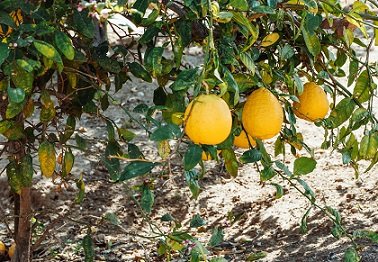Growing citrus trees like lemon trees in the garden is an interesting role for any new gardening enthusiast. If you have the space, time, and energy. You may wonder how much water do lemon trees need?
Lemon trees should be watered daily if it has been newly planted whereas matured trees should be watered once a week.
Lemon trees are indeed a great tree to have in the garden as they are so useful in the kitchen and elsewhere!
How Much Water Do Potted Lemon Trees Need?
Newly potted lemon trees need watering immediately after planting. Thereafter, a thorough, deep watering every alternate day is recommended.
The potted lemon tree will be established once its roots have recovered and grown well.
Once the tree is capable of tolerating more time without water the interval between waterings can be increased.
Watering can be left to a once a week or twice a week routine, you can use your discretion with a simple soil test.
How to Check Soil Moisture?
Testing soil prior to watering may be the only thing that can keep you from over-watering your lemon tree. Blindly watering your lemon tree is a poor decision that may have unchangeable effects.
Incorrect watering is the leading cause of lemon tree death. Here are a few tips to follow.
- Dip your finger into the first 2 to 4 inches of soil directly under the canopy of your lemon tree.
- It will either be wet, semi-wet, dry, or very dry. Decide which one it is as this will influence water requirements.
- Only water lemon trees if the soil is dry. do not water if it feels wet or more moist than dry.
- Water your lemon tree generously during each watering session.
Can’t figure out, checkout why your lemon tree doesn’t produce fruit?
How Much Water Do Lemon Trees Need?
Grounded lemon trees usually do better with generous watering every 7 or 14 days. This applies to an established lemon tree that has its root system fully developed.
But, be aware that lemon tree watering efforts must change when conditions call for it.
During summer and the approaching winter seasons, there is a vast change in the watering routine. Lemon trees need more water in summer, the main growing and fruit-producing season.
Also, the quality of your soil will dictate how fast the water drains or doesn’t drain which influences your watering schedule. We suggest using well-draining soil since lemon trees do not like to sit in moist soil all the time.
What Are the Effects of Overwatering Lemon Trees?
The worst-case scenario of overwatered lemon trees is the possibility of death depending on how long the condition goes unnoticed.
The most prominent effect of overwatering in lemon trees is death. But, before it comes to this some signs are curled leaves, yellow/brown leaves, and root rot. All of which the tree may not recover from.
A wide range of factors also decides if and if so, how soon the lemon tree will be affected by overwatering. The factors that influence overwatering are:
- Soil drainage and water-holding capacity
- Weather (amount of sun / shade)
- Season
- Airflow and humidity
- Frequency of watering
- Amount of water given per session
Signs of Overwatered Lemon Trees
Overwatered lemon trees are not the hardest condition to spot. But most gardeners fail to make the connection when the time comes. Some signs of overwatering appear the same as underwatering signs, creating more confusion.
- Lemon leaves turning brown.
- Curling or drooping of leaves. (This usually corrects itself rapidly upon generous watering).
- Dropping off of leaves in severe cases.
- Very wet soil that has even accumulated water and formed small puddles.
- The wet trunk that appears discolored and rotting.
- Soft roots that are saturated with water due to root rot.
What Are the Effects of Under Watering Lemon Trees?
We don’t mean it lightly when we say that watering happens to be the most important detail of caring for lemon trees! Just how overwatering can damage a lemon tree, so can underwatering a lemon tree.
Many people don’t know what an underwatering lemon tree or potted lemon plant looks like. Here is what to expect from lemon trees lacking water.
Effects of underwatered lemon trees are drying, wilting, or curling of leaves. Poor growth or no growth at all. There are also fewer chances of flowering and fruiting with insufficient watering.
How to Tell if Your Lemon Tree Needs Water
Lemon trees need water regularly, especially in the summer season. Giving enough water to them is important if you are expecting flowers and eventually lemons as well.
- Check the soil. If the top 2 to 4 inches are dry, watering is due.
- Keep a note of your watering efforts on a calendar.
- Assess the weather. In summer and particularly dry spells, watering should occur sooner than usual.
- Look for signs of dehydration. Discolored leaves, curled leaves, and dry leaves are a sign your lemon tree needs water.
Tips to Make Sure Your Lemon Tree Always Has Enough Water
A lemon tree lacking water might go into stress. As a result, it could put off flowering and fruiting in an attempt to conserve water. This would lead to a disappointing year without flowers or fruit. Perhaps your lemon tree may even die!
To avoid an unfruitful lemon tree, here are tips to make sure your lemon tree always has enough water.
- Never water your lemon tree (potted or grounded) without testing the moisture of the soil first.
- Make an effort to test the soil up to a depth of anywhere between 2 and 6 inches. This helps to make a true assessment of moisture held by the soil.
- Potted lemon trees need to be watered more frequently than grounded lemon trees. This is due to increased evaporation through constant air flows.
- When watering a potted lemon tree, soak it well. Pour water overhead and water until water starts draining out from the bottom of the pot.
- Mature grounded lemon trees may only need watering every 7 to 14 days. However, this may change based on some conditions like climate, season, or soil.
- Watering lemon trees generously is important as a mere sprinkling will not be enough to make the water seep deep enough to reach roots.
How Much Water Do Lemon Trees Need in Winter?
Lemon trees are vulnerable to cold and watering efforts may facilitate this damage. Hence, watering efforts must greatly decrease or even cease in some cases! Failure to reduce watering in time can affect the health of your lemon tree.
- Potted lemon trees only need a monthly watering during winter.
- Grounded outdoor lemon trees do not need watering at all during winter. This is because they are capable of sourcing all the water they need through their surroundings.
The lemon trees won’t be growing much during the winter season. Their requirements for certain resources such as water will reduce greatly. Providing them with more water and nutrients won’t lead to better results.
Overwatering lemon trees in winter is dangerous and should be avoided at all costs if you want your lemon tree to survive!
Conclusion
There is no direct answer to how much water lemon trees need. Instead, just remember that they need a generous watering that will reach the tree’s roots.
- Indoor potted lemon trees need soaking watering once or twice a week.
- Outdoor grounded lemon trees need generous watering every week or two.
Both scenarios require you to observe the conditions around the lemon trees. Different seasons, types of the lemon tree, and soil will deeply influence watering efforts. Also, watering should not happen before first testing the soil.
With this information, we hope you won’t lose your lemon tree to overwatering or underwatering.
FAQs
In winter, you should water a potted lemon tree once a month. If it is an outdoor lemon tree, do not water it at all. It can source moisture from the environment.
The best time of the day to water a lemon tree is in the morning or the evening when sun intensity is at its lowest. If done during the afternoon, almost half the water can be lost to evaporation.


